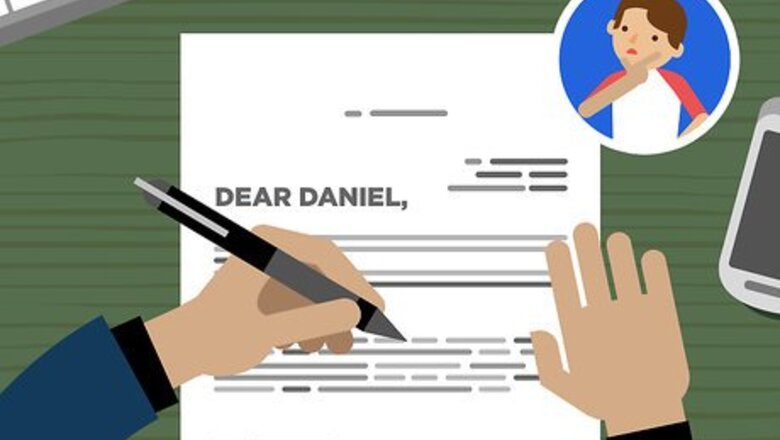
views
Writing to Someone You Know

Write to someone you already know. If you know someone who is currently serving time in prison, consider writing to them to see if they would be interested in corresponding with you. Try reaching out by saying something like, “I was wondering if you would be interested in corresponding with me while you’re there. I would like to send you some letters, if that is alright with you.” Consider writing to any family members or other loved ones who is incarcerated. Remember that they may not want to correspond with you and that’s okay. It's their choice.

Assess your reasons for writing. If you want to write to someone who is incarcerated, make sure you only have good intentions for doing so. Receiving letters can be a great way to life an inmate’s spirits and keep them hopeful while they are serving their time. However, if you really only want to write them to tease them or make them feel guilty for being locked up, that is a selfish reason to write and you might actually end up doing more harm than good. Only write to a prison inmate that you know if your intentions are positive and helpful. Also keep in mind that there are restrictions about what you can and cannot write about to inmates. You absolutely can’t write to a prison inmate with the intent to blackmail them – this will definitely get you into some trouble. You also can’t include any contraband items, like nude photos.
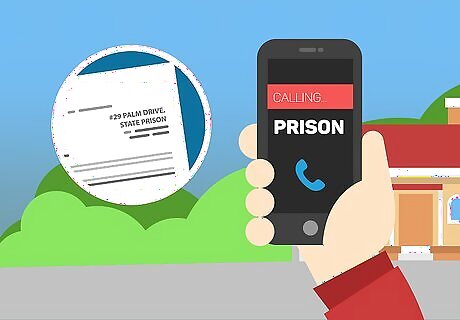
Find the inmate’s mailing address. In order to write to any inmate, you’ll need to get their mailing address at the prison. You can contact the prison to ask for a specific inmate’s address and they will normally release that information to you. Additionally, you could get in contact with other family members or close friends of the inmate to see if they already have the inmate’s address. When you address the envelope, be sure to write legibly and include all of the required information to ensure your letter is delivered. The address will probably include the inmate’s correctional facility identification number, so you’ll need to include that as well.

Send updates about your life. In your letters, send the inmate updates about things that are happening in your life and things you know they would be interested to hear about. Remember that they might feel like they are missing out, so having this connection to the outside world could be a very positive thing for them during their incarceration. Tell them about significant events in your life like birthdays and graduations. Let them know how your social and family life is going – like if you are dating someone new or a funny anecdote about how your child is driving you crazy.
Finding a Prison Pen Pal
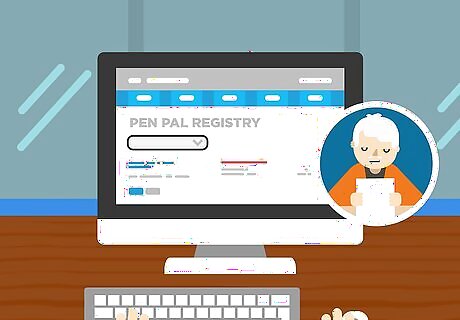
Find an inmate on a pen pal registry. There are quite a few inmate registries on the internet that provide profiles of inmates who are interested in finding a pen pal. Spend some time reading through the available profiles to find someone you would like to get to know. Try to find someone with common interests so that you can have something to build on in conversation. Make sure you choose an inmate with the same expectations as you. You don’t want to pick someone who is looking for a romantic relationship if you are not interested in that as well.

Get involved in some kind of program. Many prisons offer inmate assistance programs of various kinds that you can become involved in. These programs are designed to benefit the inmates and help them to use their time productively while incarcerated. Some such programs provide educational or tutoring support for inmates.
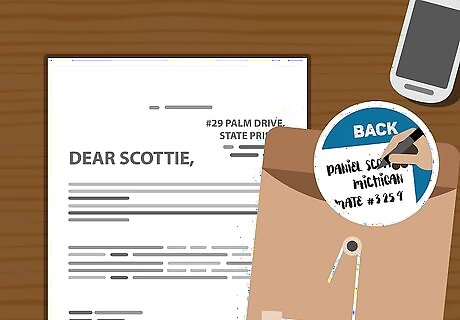
Make sure the addresses are legible. Print your name and address on the envelope neatly. You should do this also in the body of the letter in case something happens to the envelope. Make sure the inmate’s name, address, and inmate ID are clearly legible as well. To make sure mail does not get lost, put your pen pal's last name and correctional I.D. number on the back of each page or picture.

Introduce yourself. In the first letter, give some basic background information about yourself. You can describe your hobbies, interests, or a small personal description. Be sure not to include anything too personal. Introduce yourself just as you would to any person you are meeting for the first time. You can also give some words of encouragement and respond to things in their personal ad if they have one, like their love of reading for example.
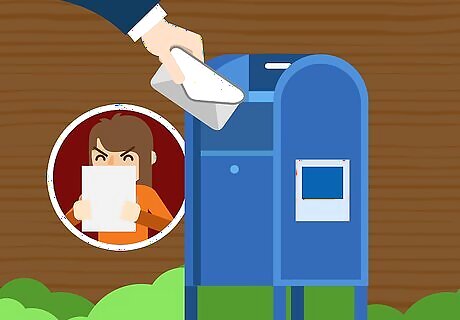
Be cautious about releasing personal information. Regardless of how close you become with your pen pal, try to remember that they are in prison for a reason. Unless you know them well (from real life or otherwise), be cautious about providing them with any personal information about yourself or your family. Consider using a post office box or mailbox, rather than a home mailing address, when writing to your inmate pen pal. Limit what personal information you include in your letters. You can send plenty of stories and details without sending information that might compromise your personal security.
Continuing the Correspondence

Be honest and friendly. Remember to be open and honest, but to keep a level-head. These inmates are not objects for amusement; they are human beings. If you choose to contact them, you should treat them with courtesy and respect regardless of what they are incarcerated for. Treat your inmate pen pal with as much kindness and courtesy as you would anyone else in your life.

Ask questions. Give your inmate pen pal something to respond to by asking them questions in your first letter. This will help break the ice a bit and hopefully make them feel more comfortable corresponding with you. Try asking them about their hobbies, interests, favorite music, favorite books, etc. Steer clear of more serious questions until later in the relationship, especially questions about their possible criminal offenses (what they are incarcerated for).

Be patient. Don't freak out if you do not get a reply right away. Remember that mail is slow for prison inmates and most prisons only give inmates mail on certain dates in the month. The inmates are very happy to receive contact from the outside world. Just because you do not get an immediate response does not mean they don't want to talk to you. Since prisoners’ email must be thoroughly screened before being distributed, it can often take much longer than regular mail.
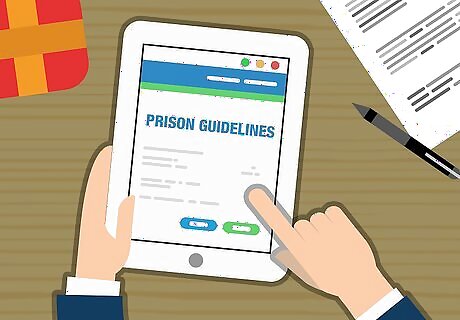
Research the prison’s guidelines. If you decide you would like to send a gift to a prisoner, be sure to find out the prison's policy on prisoners receiving gifts. This varies from prison to prison, but most prison systems have websites that you can search that will provide you with all of the necessary information regarding what is and is not permitted. Try to watch your language in your letters and anything else you send to the jail. Prisons frown on overt inflammatory language, and some strictly forbid it. Do not send unapproved gifts, information about other inmates, or any other unauthorized items. This would create problems for the prisoners. Check with the inmate you are writing to and verify with the prison’s official guidelines before sending any items. Make sure you follow any special mailing guidelines that may be required for inmate mail. Again, this information should be listed on the prison’s website.
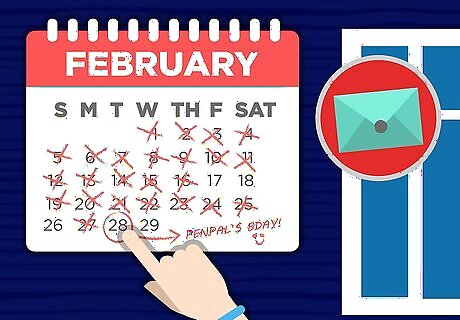
Remember special occasions. Birthdays can be a lonely time, so try sending a card or a special birthday letter. Remembering a prisoner on their birthday can have a great impact. You can find their birth date on their personal ad, if they have one. Try sending a greeting card. Greeting cards can be a great way to make someone feel special; you can find so many friendship cards to send a "hello." This can take the pressure off of you worrying about what to write, especially in the beginning.

Send a picture of yourself. This way a prisoner has a face to put with your name. Some prisoners are looking for a relationship, but others are just looking for a friend and providing a picture can be a nice sign of friendship. Of course, only send a picture if you feel comfortable doing so. Make sure any photos you send are appropriate (no nudity or lewd content), otherwise they'll get confiscated.
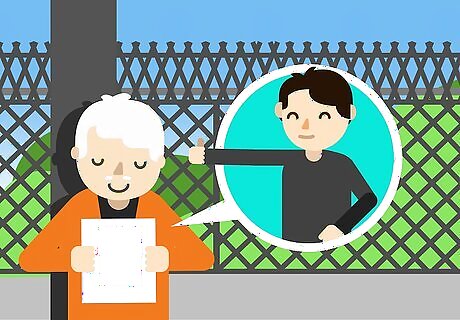
Be a friend and mentor. Be a friend to your pen pal and possibly a mentor later on. A good pen pal can help inmates overcome addictions, find family and friends, and be a positive line to the outside world. Your inmate pen pal will have a better chance of creating a productive, successful life once they are released if they have more positive, supportive influences in their life. Listen to them talk about their problems if they want to, but encourage them in the right direction.




















Comments
0 comment